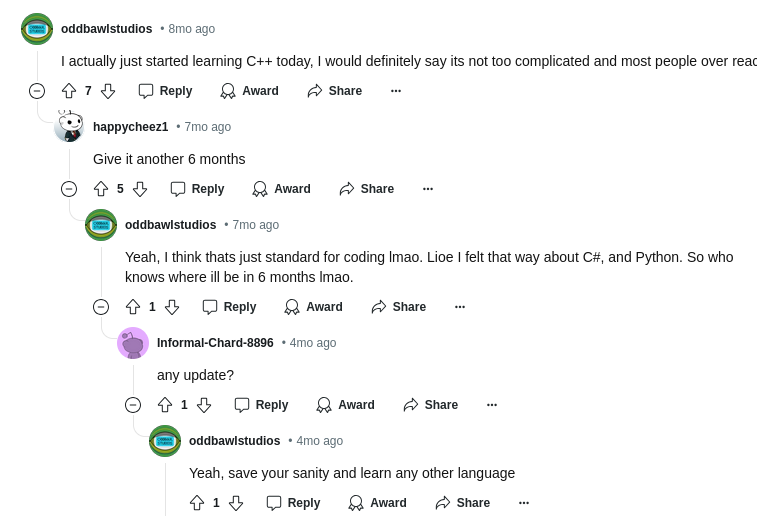this post was submitted on 02 Sep 2024
882 points (99.2% liked)
Programmer Humor
32572 readers
312 users here now
Post funny things about programming here! (Or just rant about your favourite programming language.)
Rules:
- Posts must be relevant to programming, programmers, or computer science.
- No NSFW content.
- Jokes must be in good taste. No hate speech, bigotry, etc.
founded 5 years ago
MODERATORS
you are viewing a single comment's thread
view the rest of the comments
view the rest of the comments


I guess you've never seen some of the 10-page template errors C++ compilers will generate. I don't think anything prepares you for that.
I've seen way worse. Imagine a project that uses C preprocessor structures to make a C-compiler provide a kind-of C++. Macros that are pages long, and if you forget a single bracket anywhere, your ten pages look like a romance novel.
Or VHDL synthesis messages. You've got no real control over them, 99.9% of the warnings are completely irrelevant, but one line in a 50k lines output could hint at a problem - if you only found it.
So far, the output of C or C++ compilers (except for the above-mentioned project) has not been a problem or me, but I'm doing this for about 40 years now, so I've got a bit of experience.
Yep, sadly I've been exposed to a few such codebases before. I certainly learned a lot about how NOT to design a project.
You've been at it longer than I have, but I've already had coworkers look at me like I'm a wizard for decoding their error message. You do get a feel for where the important parts of the error actually are over time. So much scrolling though...
Yes, after decades of scanning large pages of text - code, errors, logs, search results, etc - a programmers ability to apply pattern recognition to screens of letters can be truly remarkable.
Yes, I have my share of coworkers asking me when they run into problems, too. They even ask me when they have Windows problems. And I don't do Windows - I do Linux and embedded systems.
I had to do a module programming in VHDL for my EE degree.
Every time I see it mentioned anywhere I have a compulsion to scream: FUCK VHDL AND ITS FUCKING ERRORS! NO YOUR ANALYSIS & SYNTHESIS IS UNSUCCESSFUL!
I did not pursue a career in electronics…
One of the key problems of learning VHDL at universities is that most teachers there are amazingly clueless about the language. Not only do you need a bit of a different mindset (you do not program, you define), but their knowledge of language and systems is stuck in the last century.
When I was a regular in a VHDL group on the site we don't mention here, we regularly had students who got taught techniques that are obsolete or at least deprecated since 1989.
I've not had those while working with concurrent programs with c++ for over a year. Pointers, QT programming, non-qt backend programming, coding an engine to work with computer vision runners (openvino mostly), image management (more pointers)... Idk, this is gonna sound rude but just code better? Most of my errors were segfaults, I have had to plug the debugger and/or tons of prints and I made it work.
If you want to see giant error logs, check pyspark errors. But even those have the relevant line of info and then all the rest of the garbage info that no one really needs, like any other language.
It really depends what you're doing. The last big project I did with C++ templates was using them to make a lot of compile-time guarantees about concurrency locks so they don't need to be checked at runtime (thus trading my development time for faster performance). I was able to hide the majority of the templates from users of the library, and spent extra time writing custom static_assert messages.
C++ templates are in fact a compile-time turing complete language, as crazy as that sounds.